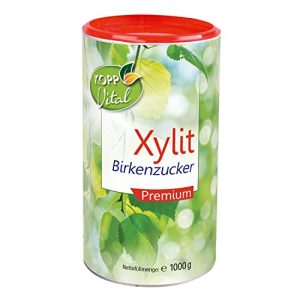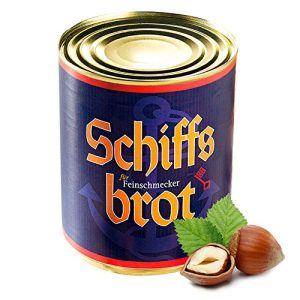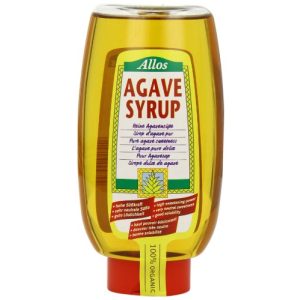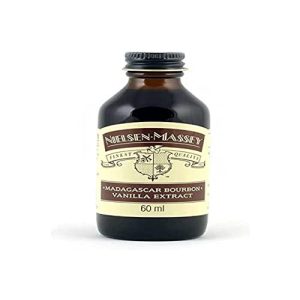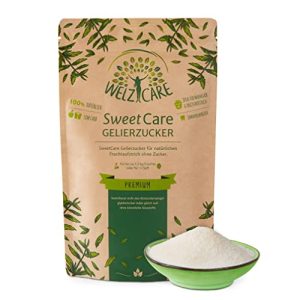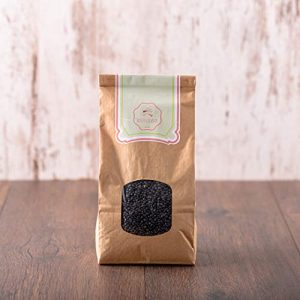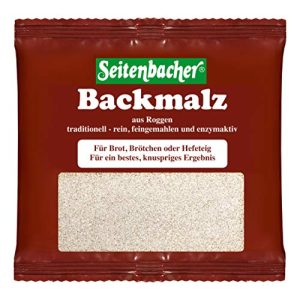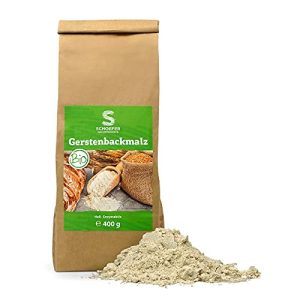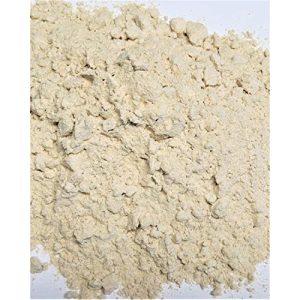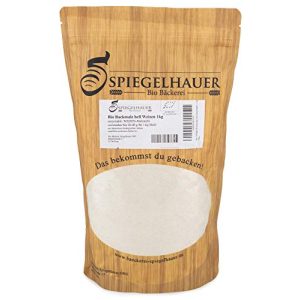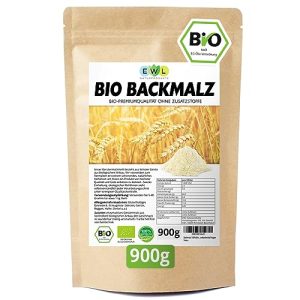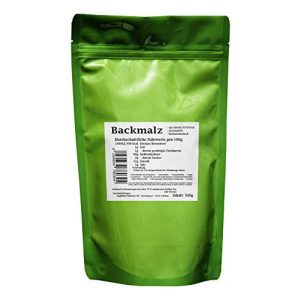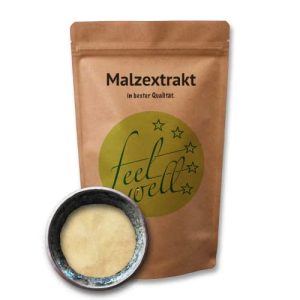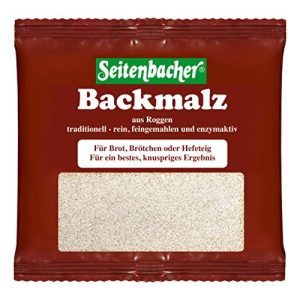Baking malt test & comparison: The ultimate guide for the best purchase
Discover the top features and selection criteria for baking malt in our comprehensive comparison
- Baking malt, also known as malt flour, is an essential element in the baking industry. It is a natural product made from sprouted grains. It not only improves the taste, but also influences the texture and color of baked products, making it an essential ingredient in many recipes.
- Baking malt is also valued for its yeast-feeding properties. It promotes dough fermentation and gives the sourdough its characteristic acidity. Another benefit of baking malt is that it strengthens the gluten network in the dough, resulting in better dough volume.
- Overall, baking malt plays an important role in the global food industry. The increasing demand for natural and healthy ingredients has led to increased use of baking malt. Despite growing competition from alternative baking aids, baking malt remains an integral part of the baking industry.
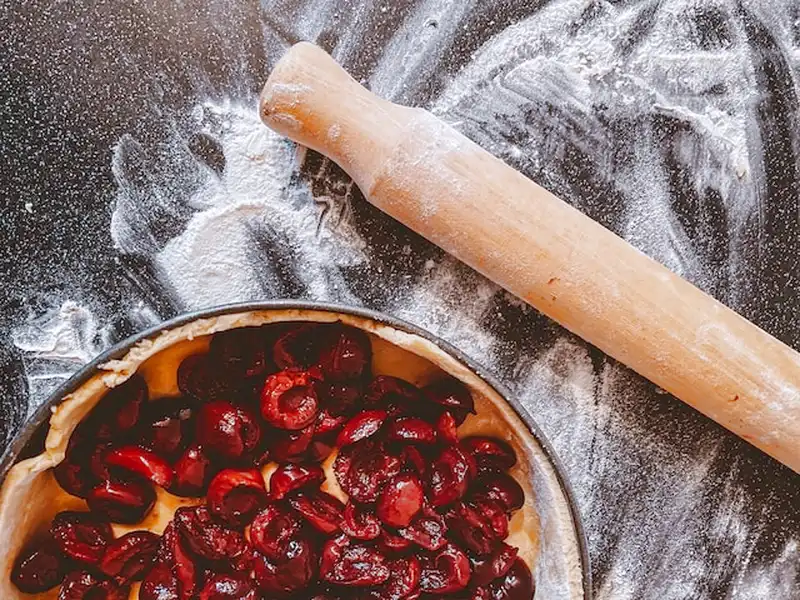
Baking malt in the test & comparison: Which is the best product for your dough?
How do you actually recognize an excellent one? Baking malt? This question drives many people Amateur baker and professionals, because this Malt for baking is much more than one tailored baking ingredient: It is a Dough improver, which contributes significantly to the taste and texture of a bread. At the Baking It depends on every detail and the right one Baking malt can make the difference between a good and a great baking result.
My research selects from the multitude of options on the market – from EWL Baking malt to organic bakery Spiegelhauer to Donath Mühle and Moritz & Jakob – and is dedicated to a comprehensive comparison.. I examine which products actually impress in terms of quality and price and test how they relate to this in practice baking bread impact. My goal is to identify the best product for you and your baking projects while taking an objective look at the bestsellers.
Purchase overview: Your guide to baking malt
- Enzyme-active or enzyme-inactive: Both types of baking malt have specific advantages in dough.
- Baking malt not only improves the taste but also the consistency of the bread.
- The best product depends on the type of flour and the desired end result.
- Price comparisons can help, but quality should not be ignored.
- Customer reviews and best lists are useful tools when choosing baking malt.
- Organic certification and a sustainable manufacturing process are increasingly becoming purchasing criteria.
- Proper storage of baking malt is crucial to maintaining its quality.
Amazon's selection: Discover high-quality baking malt for perfect dough and aromatic baking results on Amazon
- made from 100% rye
- aromatic taste
- crispy crust
Introduction: The importance of baking malt for the bakery
As a baker for many years, I am deeply immersed in the world of baking ingredients I immersed myself in everything about it Bakery supplies busy. especially the Dough making I liked it. I've always noticed how essential good baking malt is. It is a traditional one Baking agent, that's not just that
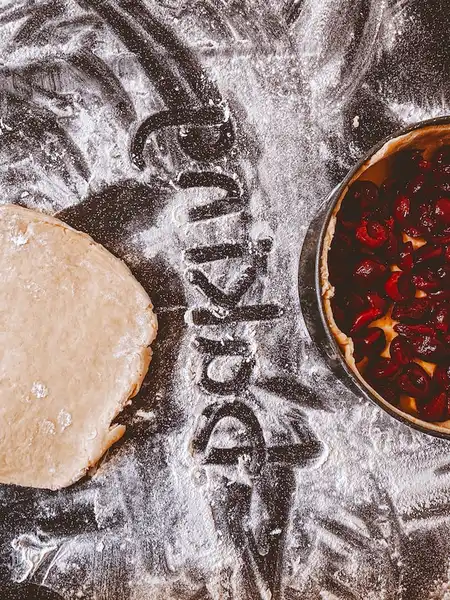
Different Varieties: There are different types of baking malt, including light malt, dark malt and roasted malt, each with different flavor profiles and uses.
The structure and shelf life of baked goods is enriched, but it also significantly influences the taste and consistency.
In my bakery I use different types of baking malt, which can be divided into two categories: enzyme-active and enzyme-inactive malt. Depending on what product I want to make, I choose the appropriate shape to achieve the best result. This flexibility makes baking malt a diverse and essential component Bakery ingredients.
Baking malt is the heart of good baked goods. It brings out the flavor and allows the texture to shine.
- quality Baking agent for first-class pastries
- Powdered and liquid baking malt for individual needs
- Enzyme-active variants to optimize dough quality
- Enzyme-inactive baking malt for a characteristic taste
Using baking malt allows me to always keep my customers' bread baking experience fresh and exciting. My focus is on that High quality and to preserve the traditional methods that have always characterized the bakery craft.
Types of baking malt: enzyme-active or enzyme-inactive?
Baking malt plays a central role in the production of bread; a primary distinction is made between: enzyme-active and enzyme inactive baking malt. Both Varieties have different properties and are for different purposes End products matter, especially when it comes to Dark bread goes.
Enzyme-active baking malt and its effect on the dough
Enzyme-active baking malt is an essential one Dough improver in the modern bakery. This special malt not only promotes dough maturity and supports yeast process inertia during fermentation by providing fermentable sugars, it is also an effective malt Baking enhancer. The enzymes it contains accelerate the breakdown of starch, which is essential fluffyTo obtain well-loose bread with an attractive crust color and structure - thanks to the Maillard reaction, attractive browning of the crust is guaranteed.
Enzyme-inactive baking malt: flavors and color for dark breads
The situation is different with enzyme-inactive baking malt, which we often go by the name aromatic malt or Roasted malt find. Its strength lies less in influencing the enzymatic processes in the dough than in refining it Dark bread by deepening the taste and characteristic coloring. This dark baking malt is popular for its ability to intensify the aroma and color of bread products, which not only makes breads more visually appealing, but also richer in taste - the crust acquires a darker shade, and the loaf of bread exudes an irresistible scent that should not be missing in any bakery .
Bakery quality for home: baking malt from Amazon - the secret to juicy bread, crispy rolls and delicious cakes
- ✅ Excellent quality: You will receive high quality from us...
- ✅ Excellent: Everyone can use our bamboo flour from ...
- ✅ Excellent: To achieve the best results...
The top products: Rating of the best baking malts
In my pursuit, the best Buy baking malt, Do I have the top products examined more closely. Renowned suppliers such as EWL, Bio Bakery Spiegelhauer, Donath Mühle, Moritz & Jakob and feel well have it thanks to excellent Reviews made it to the top. They were convincing Baking malt in comparison with a “very good” in customer reviews.
Each of these manufacturers offers unique benefits that can enrich your baking experiences. Be it the fine grain, which is particularly important in cakes and pastries, or the high protein content, which is essential for voluminous breads. The price category also plays a role for professional use in the bakery business. A closer look is required here:
- EWL baking malt: Particularly recommended for its consistently consistent quality and fine grain.
- Organic Bakery Spiegelhauer: The organic ones deserve special mention Ingredients and conscious action in harmony with nature.
- Donath Mill: Impresses with a diverse range that includes both enzyme-active and enzyme-inactive variants.
- Moritz & Jacob: Their products are characterized by an optimal price-performance ratio and are therefore often purchased by bakeries.
- Feelwell: Stands for a balanced protein profile, which makes the baking malts particularly nutritious.
During the evaluation process, I paid particular attention to how the products affected the consistency and volume of the dough. I noticed that there is a clear preference among both home bakers and professional bakeries for high-quality baking malts that are produced sustainably and environmentally consciously.
In my tests, I found that ambitious bakers Buy baking malt value a combination of quality and sustainable production. This is reflected in the customer reviews of this top products contrary.
Application tips: Use baking malt optimally in the dough
The art of baking bread requires sensitivity and knowledge of the right ingredients and their dosage. Especially when it comes to Baking malt To use it, some tips and tricks are helpful to ensure that Dough design and taste come into their own. No matter whether you light bread or Dark bread prefer the right one Baking malt dosage can make the difference.
The correct dosage of baking malt
Baking malt comes in two varieties: enzyme-active and enzyme-inactive. Both types contribute to the quality of the final product in different ways. For light bread, such as white bread and baguettes, the use of enzyme-active baking malt is recommended. The rule of thumb is to add baking malt to around 0,5 to 3 percent of the flour weight. This promotes dough development and gives the bread a nice golden-brown crust.
In contrast, you should be careful with enzyme-active malt when making rye dough, as rye is naturally rich in enzymes. Adding too much could soften the dough significantly. Here, a lower dosage or the use of enzyme-inactive malt may be advisable in order to support the dough structure and still benefit from the aroma benefits.
Dark vs. light baking malt: Different areas of application
Während light bread The use of enzyme-inactive malt tends to benefit from the liveliness of enzyme-active baking malts dark bread, ideal for intensely tasting types of bread. Dark baking malt Not only does it bring color to the dough, but also a strong aroma that bread lovers will particularly appreciate.
So it is crucial to know the type of bread and the characteristics you want in order to How to use baking malt optimally, With these application Tips and the right dosage not only give your baked goods an overwhelming aroma and attractive appearance, but also a texture that perfects the bread experience.
Versatile application: Get the versatile baking malt from Amazon for bread, pastries, pizza and sweet treats
- Addition quantity 1 - 4% of flour quantity
- Ingredients: 100% organic BARLEY malt
- ideal for baking bread
Organic baking malt: a sustainable choice
As a consumer, one suits me sustainable and healthy lifestyle very close to heart. That's why I'm sitting down Organic baking malt, which comes from organic farming and thus contributes to the preservation of the environment. The conscious decision for Organic baking malt-Products not only reflects my commitment to nature and health, but also ensures that my baked goods are of the highest quality and free of unnecessary additives.
By purchasing sustainable baking ingredients like Organic baking malt from recognized mills such as organic Spiegelhauer Bakery or the Donath Mühle, I can be sure that no synthetic fertilizers or chemical pesticides were used in the production. This commitment can also be found in the fine grain and the high Protein content, which benefits my baked products.
Choosing organic ingredients is a step towards one ecological and responsible lifestyle, which should not stop at baking.
- use of Organic baking malt supports biological diversity
- Guaranteed origin from controlled organic cultivation
- Achieving excellent baking quality through natural enzyme activity
Because I am for Organic baking malt If I decide, I make a small but important contribution to our planet and promote sustainable agriculture.
Baking malt in a professional bakery business
As a passionate, professional baker, I always strive to create products of the highest quality. This requires specific attention Bakery ingredients a crucial role. Particularly Baking malt for professional bakers is indispensable here in order to optimize the quality of the dough and bring out distinctive flavor nuances.
There is a large selection of baking malt, but which types achieve the best results in daily use? Deciding which malt to use depends on various factors, such as the type of bread I'm making and my customers' preferred flavor profiles.
- Multigrain bread benefits from a malt with intense roasted aromas.
- Mixed wheat breads develop a more attractive crust and crumb with a mild, enzyme-active malt.
- For sweet pastries, I often use a malt with a lower roast level to achieve a subtle sweetness.
A consistently high quality in the Dough making and therefore also in the end product is important to me, which is why I rely on verified suppliers who provide reliable, high-quality products Bakery ingredients provide. This professionalism in the selection contributes significantly to my business success. Because the satisfaction of my customers is and remains the measure of all my efforts and the best indicator of the quality of my work.
Baking malt for special doughs: spelled, rye and pizza dough
The ingredients play a crucial role in the production of unique types of dough such as spelled, rye and pizza dough. Here comes Baking malt into the game, which not only improves the taste but also the structure.
Improving the taste with baking malt for rye bread
Rye bread is characterized by its hearty aroma. By adding Baking malt for rye bread I can not only intensify its taste, but also a clear one Geschmacksverbesserung achieve. The full, aromatic profile of rye bread is taken to a new level by baking malt. Even if rye dough already contains natural enzymes, the targeted use of baking malt also supports the flavor and the unmistakable bread character.
Improving the dough structure of pizza dough with baking malt
A good pizza dough requires elasticity and suppleness for perfect handling. When kneading Pizza dough has Baking malt proven to be a valuable addition to the Improve dough structure. It gives the dough an optimal ratio of strength and elasticity, which simplifies processing and leads to a more even baking result. The usage of Pizza dough baking malt is therefore a proven trick to optimize the quality and texture of the pizza.
- Intense taste and aroma in rye bread
- Optimized dough structure for pizza dough
- Easy to use and better results when baking
My personal conclusion: By using baking malt, both professional bakeries and... Amateur baker to outstanding results with specialized doughs. My experience is reflected in the quality of the end products, which undoubtedly depends on the selection of high-quality ingredients.
Natural baking power: Baking malt from Amazon - the traditional ingredient for optimal dough development and a full aroma
- BETTER BAKING: Do you prefer to bake your breakfast sandwiches yourself? Then this organic...
- DOSAGE: This malt made from wheat is due to the small amount required (max. 30 grams of baking malt...
- WITHOUT ADDITIVES: This high-quality baking agent contains no other additives such as...
Regional diversity: baking malt offers in Germany
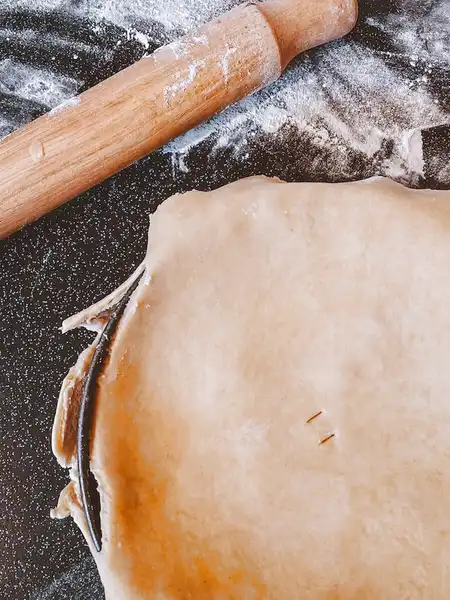
Natural origin: Baking malt is made from grains such as barley, wheat or rye and contains natural enzymes that support the fermentation process.
The search for high quality Baking malt in Germany leads interested bakers to a rich one regional diversity of products. My personal impression is that this diversity not only increases the quality of the baking results, but also reflects cultural and local characteristics. Different regions offer unique varieties of baking malt, depending on the grains and production methods preferred there.
If you ask yourself, Where to buy baking malt, it's gratifying to see how easy it is these days to find regional providers and mills with a distinctive range to discover. They not only offer conventional products, but also surprise with organic and special malts that give each bread a distinctive touch.
- Northern Germany – Here you can often find baking malt, which is made from the hearty rye.
- South German mills – These are known for finely balanced wheat malt.
- Organic mills – distributed throughout Germany, offer organic baking malt from environmentally friendly cultivation.
The regional diversity of baking malt is a reflection of our rich culture and makes it possible to reinterpret traditional recipes or create completely new taste experiences. By supporting local mills and suppliers, we also contribute to maintaining this diversity. Personally, when looking for the perfect malt, I value taking into account the regional character and origin and thus the regional Economy support.
Baking malt is more than just an ingredient - it is a piece of home that every baker can bring into their baked goods.
Baking malt in home use: tips for baking at home
The Baking at home has become a popular one Hobby developed for many people. Amateur baker appreciate the quality and taste of home-baked bread. Baking malt plays a central role here, especially when it comes to the quality of the dough. With a few simple tips, anyone can Beginner Baking malt recipes master and conjure up creative bread creations.
Baking malt in bread recipes for beginners
Just as Beginner im Baking at home you are often faced with the challenge of getting the dough right. Baking malt can help because it improves the dough flow and leads to a more tasty result. A simple bread recipe can be significantly improved with just a small addition of baking malt. It should be noted that enzyme-active malt is generally used for white or mixed breads with a high proportion of wheat flour, whereas enzyme-inactive malt is increasingly recommended for rye breads.
Creative baking malt recipes for hobby bakers
Amateur bakers who want to expand their skills in the bakery can experiment with baking malt recipes that go beyond the classic bread dough. Interesting variations arise, for example, with the inclusion of spelled or other whole grains in the production of bread. Vegan or gluten-free recipes also benefit from baking malt, as it improves the dough structure and gives the bread a nicer crust. It can be said: Baking malt brings the crunch and spice to the bread that makes it so irresistible fresh from the oven.
- Wholemeal spelled bread with baking malt for a nutty note and great crusts.
- Vegan bread creations, in which baking malt is used as a substitute for animal ingredients.
- Gluten-free bread variants, which are improved with special gluten-free baking malts.
Once you have familiarized yourself with the basics of baking with baking malt, you will be surprised at the variety of breads and pastries you can make at home. The joy of enjoying fresh, home-baked bread together will certainly be even greater with some baking malt recipes!
Buying baking malt: Where and what you should pay attention to
When buying baking malt, be it from a specialist retailer or online, you should always take a few key points into account. It starts with the decision where to buy baking malt in Germany. Traditional shopping locations such as supermarkets and health food stores offer a common selection of products, but this opens up Buy online a much greater variety, including the possibility of Buy organic baking malt online or special varieties like Baking malt gluten-free online to acquire.
An important aspect to pay attention to is the quality of the baking malt. It is advisable to prefer products from established and trustworthy brands and to read customer reviews carefully.
Another criterion is the type of malt. As well as enzyme active as well as most enzyme inactive Malts have different uses in baking. Knowledge of this is crucial in order to achieve the desired effect in the baked goods.
Also pay attention to organic certification if you value organic farming and sustainability. Buy organic baking malt online is often associated with transparent information about origin and processing processes, which are important for the conscious consumer.
- Check organic certification and other quality seals.
- Understand the difference between enzyme-active and enzyme-inactive variants.
- Find out about the origin and production process of the malt.
- Read customer reviews for an independent opinion.
Last but not least, the correct storage of the purchased baking malt plays an important role in maintaining quality. Always ensure one dry and dark storageto ensure the durability and effectiveness of the malt. This ensures that your baked products always turn out well and achieve the intended taste and texture.
What is baking malt?
Baking malt is an important ingredient in bakery and is a product made from roasted malt. It is commonly used in bread and pastry recipes to add flavor, color, and texture to the dough. It can be purchased in liquid or powder form.
The baking malt contains enzymes that work during the baking process and make the dough sweeter and richer. It also gives the bread and pastries a caramel-like crust and increases moisture, which helps it stay fresh longer.
Nutrients and ingredients of baking malt
Baking malt contains a variety of nutrients and components that are important for the body. Here are some important ones:
· Carbohydrates
Baking malt is a good source of complex carbohydrates that are slow-release and provide longer-lasting energy.
· Protein:
Baked malt also contains a small amount of proteins, which are important for building and repairing body tissues.
· Vitamins and minerals:
Baking malt also contains a small amount of vitamin B and minerals such as magnesium, phosphorus and Zinc.
· Antioxidants:
Dark baking malt also contains antioxidants that can help fight free radicals in the body.
· enzymes:
Baking malt also contains enzymes that work in the baking process, making the dough sweeter and richer.
However, it is important to note that baking malt also contains gluten and is not suitable for people suffering from celiac disease or gluten intolerance. It should therefore be used with caution when preparing gluten-free bread or pastries.
Use of Baking Malt in Bakery
Baking malt is often used in the bakery to give a special flavor and texture to bread, pastries and other baked goods. Here are some uses of baking malt in the bakery:
- Flavor Enhancement: Baking malt adds a sweet, nutty flavor that's especially noticeable in whole-wheat bread and dark-colored pastries.
- Texture Enhancement: Baking malt helps make the dough more pliable and elastic, resulting in better texture in the baked bread or pastry.
- Color Enhancement: Dark baking malt can be used to make a golden color in bread and pastries.
- gassing: Baking malt contains enzymes that work in the baking process, helping the bread puff up and create a larger air pocket.
- Longer durability: Baking malt can also help bread and pastries stay fresher longer by slowing moisture loss.
What types of baking malt are there?
There are three main types of baking malt: barley malt, wheat malt and rye malt. Barley malt is made from barley grain and is widely used in baking to improve dough quality, increase moisture absorption and extend the shelf life of bread and pastries. Wheat malt is made from wheat and gives the dough a better consistency and a golden color. Rye malt is made from rye and is commonly used to add a distinctive flavor and deeper color to bread and pastries.
How is baking malt incorporated into the dough?
Baking malt is usually incorporated into the dough by soaking it in water to form a mash before kneading. This mash can then be incorporated into the dough to achieve the desired effect. Depending on the recipe and the intended use, the ratio of water to baking malt can vary, but it is usually 1:3 or 1:4. It is important to follow the recipe's exact directions to get the best results. It's also important to note that baking malt should not be used on its own, but rather as part of a larger batter recipe.
Can you replace baking malt with other ingredients?
Yes, baking malt can be replaced with other ingredients, but it depends on the desired effect in the final product. A common substitute for baking malt is molasses or honey, which offer similar flavor and texture characteristics but bring a flavor of their own. Sugar syrup can also be used in some recipes. Other possible substitutes can be thick juices such as agave syrup or rice syrup. It's important to note that any substitute may have a different consistency and taste than baking malt, so it's best to adapt a recipe or experiment for the best results.
How is baking malt stored and preserved?
Baking malt should be stored in an airtight container to avoid moisture and light. It is best to store it in a cool, dry place, such as a Basement or a pantry. If stored properly, it has a long shelf life of several months to a year. However, it is important to check if it has an unusual smell or taste after long-term storage, which may indicate perishability. It is also advisable to monitor the usage dates on the container to ensure it is still fresh.
Where can you buy baking malt?
Baking malt can be purchased at many supermarkets and grocery stores. It is usually found near other baking ingredients such as flour, sugar and spices. It can also be purchased online through e-commerce websites like Amazon or specialized grocery stores. Some bakeries and health food stores also offer specialty varieties of baking malt, such as organic or unrefined options. It is important to ensure that one purchases a high quality brand to achieve the best results in the baked goods.
Trust in quality: Baking malt – order now from Amazon
- ❤️ Natural organic barley malt flour. Strictly controlled quality. 100% organic...
- ❤️ Baking malt helps you bake great bread and rolls like at an organic bakery. Rustic...
- ❤️ 100% quality. Only organic barley was used. No additives such as wheat malt,...
Alternatives to baking malt: Other natural dough aids
When it comes to gluten-free baking, finding the right one is often a challenge Finding balance between taste and texture. However, the common baking malt alternatives also offer suitable solutions for those affected by celiac disease that do not contain the gluten protein and still provide the desired results Baking malt effect achieve.
Baking malt alternatives for gluten-free baking
There are various options for producing gluten-free baked goods Alternatives to baking malt. Instead of the traditional malt obtained from grain, products based on Rice, corn or other gluten-free raw materials. These alternatives support the baking process without the risk of gluten contamination and thus enable a carefree baking experience for people with gluten intolerance.
Natural baking enhancers as a replacement for baking malt
In addition to gluten-free There are also natural alternatives Dough aids, which do not require any malt at all. honey, molasses or agave nectar are examples of natural Baking enhancer, which are well suited for use in dough not only because of their sweetness, but also because of their moisturizing properties. These natural ingredients can help a similar Baking malt effect and are an excellent option for those who want to avoid both gluten and industrial dough aids.
- Honey promotes the browning of the dough and brings a natural aroma.
- Molasses, a byproduct of sugar production, gives baked goods a distinct color and caramelized flavor.
- Agave syrup is particularly popular in vegan baking and helps loosen the dough natural sweetness.
Choosing the right one Baking malt alternative should always be tailored to the specialty being baked and your own dietary preferences. By experimenting with different natural dough aids and Alternatives to baking malt The baking experience can be individually designed and taken to a new, health-conscious level.
Conclusion: The right baking malt for perfect baking results
The decision for the right baking malt can have a significant impact on the quality of our baked goods. Around perfect baking results To achieve this, it is essential to deal with the different types of baking malt. There are relevant differences between baking malt powder and liquid baking malt, as well as between enzyme-active and enzyme-inactive malt. With well-founded Baking malt facts and information The potential of the baking agent can be fully exploited and the art of baking taken to the next level.
My advice: It's worth knowing the benefits of different types of malt and trying them out. Organic quality and gluten-free options are available to suit every need cover. Effect and benefits The benefits of baking malt are varied - from improving the consistency of the dough to adding an aromatic flavor to extending the shelf life of the baked goods. Finding the ideal baking ingredient for your individual project based on customer feedback and objective test results leads to results that are pleasing to both the palate and the eye.
Finally, I want to emphasize that there is no one-size-fits-all solution when it comes to baking malt. Every baking project has its own requirements, and so I recommend carefully tailoring the properties of the malt you choose to suit your own goals and preferences. Whether with the traditional baking bread or for special creations – the right choice of baking malt makes a decisive contribution to enjoyment.
FAQ
What is baking malt and what is it used for?
Baking malt is a natural baking ingredient made from sprouted grains such as barley, wheat or rye. It improves the crumb and crust properties of baked goods such as bread and rolls by positively influencing the taste, consistency and shelf life. It also serves as Dough improverby promoting the enzymatic processes in the dough.
What are the differences between enzyme-active and enzyme-inactive baking malt?
Enzyme-active baking malt contributes to the breakdown of starch and supplies yeast with fermentable sugars more quickly, which has a positive effect on gas retention, the quality of the dough and the browning of the crust. Enzyme-inactive baking malt, too aromatic malt or Roasted malt called, however, is primarily used for Geschmacksverbesserung and coloring dark bread without accelerating enzymatic processes.
How do I correctly dose baking malt when baking bread?
For wheat-dominated doughs, the dosage of enzyme-active baking malt should be around 0,5 to 3 percent of the amount of flour. Care should be taken with rye dough due to its natural enzyme activity - only a small amount of active malt should be added if necessary.
Can I use baking malt at home and where can I buy it?
Yes, baking malt can also be used by home bakers to improve bread and baking recipes. It is available in supermarkets, health food stores and online. When purchasing, you should pay attention to the quality, origin and any organic certifications, as well as whether it is an enzyme-active or enzyme-inactive malt.
Are there gluten-free alternatives to baking malt?
Yes for gluten-free baking There are baking malt alternatives that are based on gluten-free raw materials such as rice or corn. These products are suitable for people with celiac disease or gluten intolerance and may have similar properties to traditional baking malt.
What role does baking malt play in professional bakeries?
In professional bakeries, baking malt is an indispensable ingredient for improving dough quality and creating flavor nuances. It helps ensure consistent quality and can be crucial to customer satisfaction.
How can I use baking malt in bread recipes and pizza dough making?
Baking malt can be used in bread recipes to improve dough control and the end result. When making pizza dough, baking malt can help optimize the elasticity and handling of the dough.
Are natural baking enhancers a good alternative to baking malt?
Natural Baking enhancer such as honey, molasses or agave syrup can be used as a substitute for baking malt to naturally sweeten dough and improve its texture. They offer a good alternative, especially when specific nutritional needs or preferences need to be taken into account.

